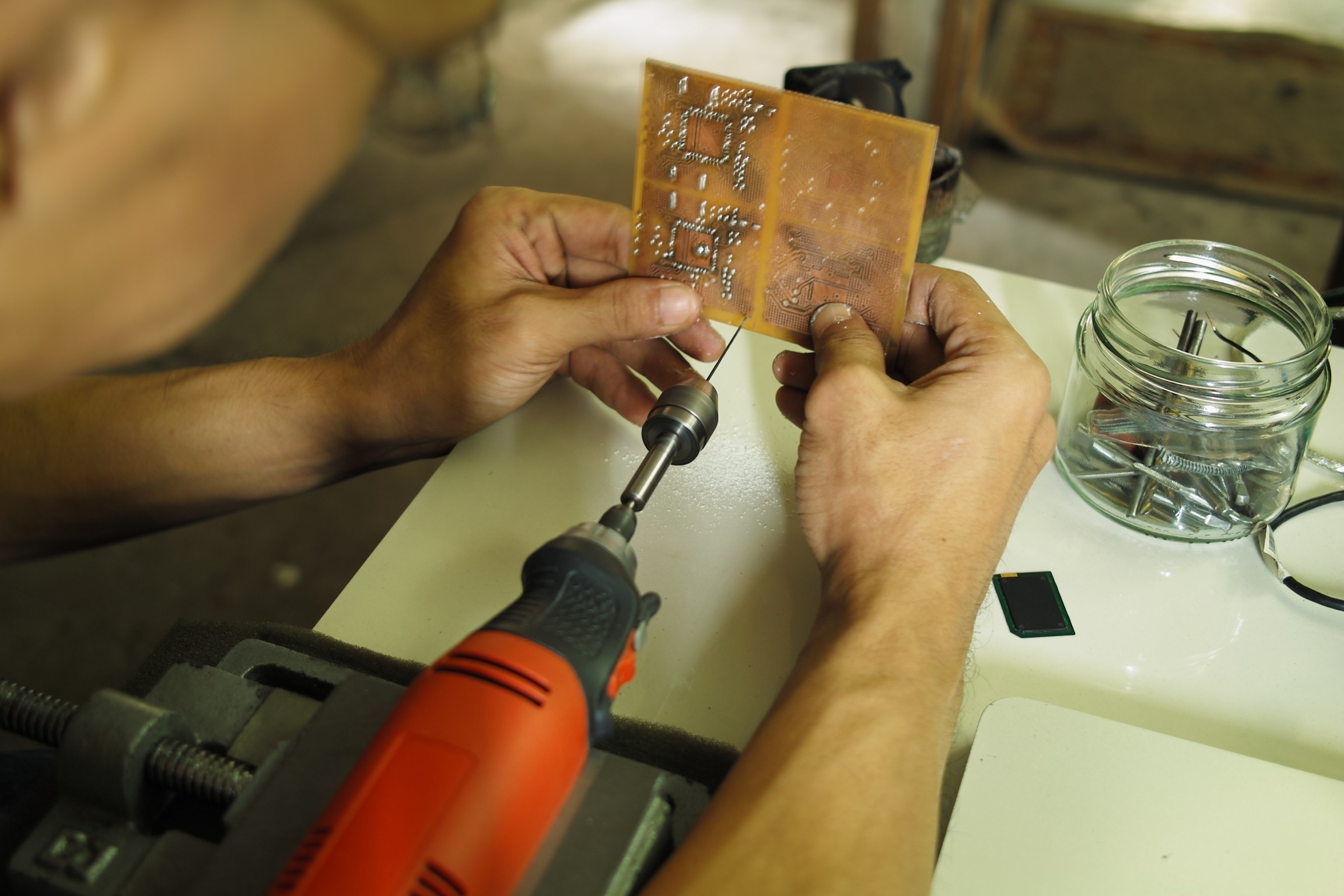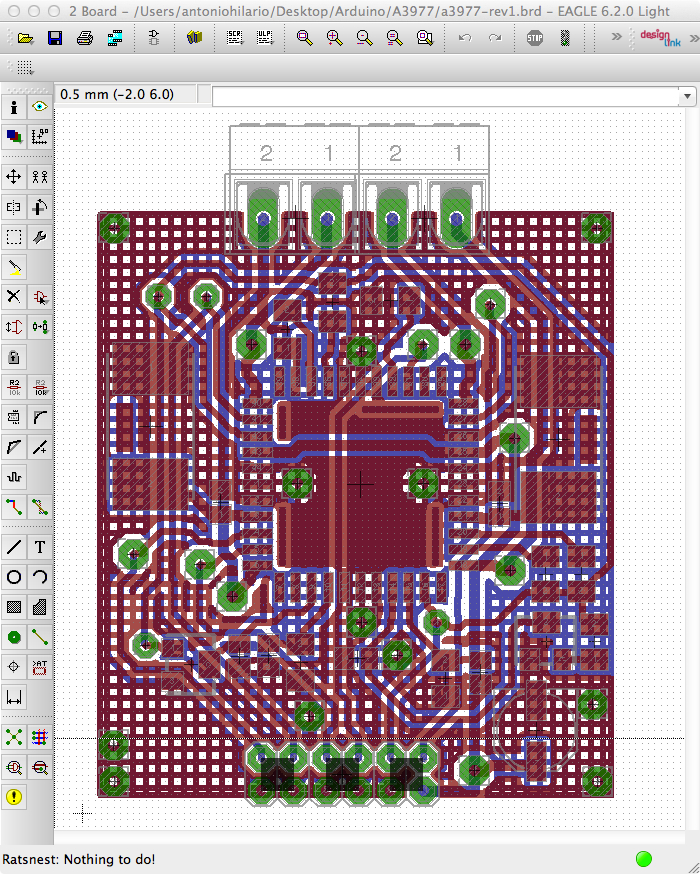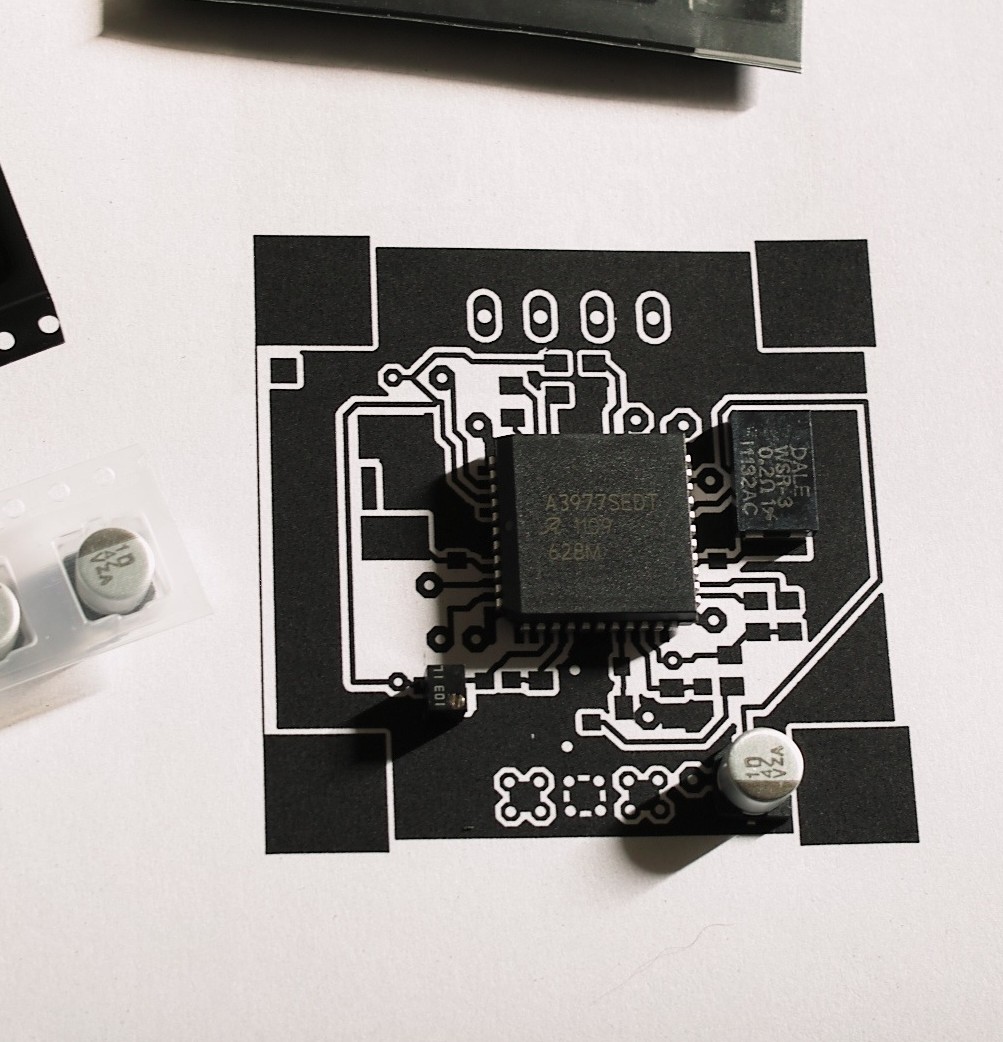It is the day. Today is the day when we finally assemble the first of three motor controllers. Rather than ruin a perfectly well-etched board, we’ll experiment with a vise-mounted, handheld power tool to drill 0.8mm vias into our test board. The test board is a reject from a previous expose-and-etch attempt that had uneven trace widths.
Thinking CNC – Before reflow
Haven’t gone out to get an oven toaster yet, so assembly of the first prototype board will have to wait until next weekend. Meanwhile here’s an update of what’s been done so far.
Paper Prototype
Taking a paper prototype to places it really can’t go. This is just a test of placement – the 1-1 size layout simply serves to verify that our parts will rest correctly on the pads.
The circuit layout was done in Cadsoft Eagle, with circuit traces that are at minimum 0.5mm wide. It took several days of tweaking the schematic and the layout to ensure that this board could be assembled at all: The screw terminal block (for the motor) and pin headers (for the Arduino) needed to have solder pads all on one side of the board. Any vias would have to be hand-soldered after oven reflow, using snippets of copper wire.
Now to get back to work – etching this over the weekend, after I buy a small oven toaster and thermometer.
Thinking CNC – Some more bootstrapping
I’m tickled by the thought of building a chair lift, if this CNC table project doesn’t pan out.
Much thanks to RS Electrocomponents PH for reducing the sheer physiological stress an order of magnitude, of my putting this CNC project together. You folks rock!

Warning: Possibly (?) Libelous Content
AN OPEN LETTER TO OUR SENATORS
15th CONGRESS OF THE PHILIPPINES
Welcome to the 21st Century, Senators. Time to wake up. Are you awake yet? Please wake up, I, citizen, have a request to make of you. The past two weeks seems evidence that most of you were not.
I am referring to that odd reply by Senator Escudero to questions from media, concerning how changes were made to the law after the period for amendments. I dismiss the claimed possibilities of incompetence, neglect, or unmindfulness leading to inclusion of onerous provisions in RA 10175. That backhanded, awkward attempt at humility (“we made mistakes”) leaves me to conclude that what occurred was plain and simple misuse or abuse of power, depending perhaps only on whether you miscalculated whether the President would either veto or sign RA 10175 into law. I don’t know; the legislative process is inscrutable to me.
What bothers me is the completely hamfisted, clumsy way in which the prerogatives of the Senate were mislaid, in order to apply arguably bad law to the domain of electronic communication. Surely, you must realize that, these days, the Internet is a powerful medium by which the electorate share and form our opinions on many issues, including political issues. It is an outstandingly new property of this medium that we are no longer subject to just a one-way flow of information downward from the centers of power, through the filter of the news media. It allows horizontal transfer as well, as much of news and information between strangers, as of greetings and letters among friends. Use of the Internet is very very important to us. With our history, and the 21st of September so temporally close to the day of signing, we could not possibly have missed those insertions. Senator Guingona didn’t miss them; how could the rest of you have?
Now, I make no mistake of assuming that all this communication only builds communities, or even mostly contains useful matter with great civic import. A lot of it is, indeed, drivel: Irrelevant to uses other than to satisfy the message senders’ private goals. And some of this communication, we have all seen, is intended for pernicious ends. I think Stuxnet and spam.
And yet: a good deal of what we citizens exchange between us will pertain to issues of the day, and indeed reflect much disappointment, anger, or even rage at the failings of government, or of specific persons in government. Or else placid complacency when things run well; when things promised by politicians turn out well. Thus it will continue to prove itself of great utility to an electorate that wants to participate responsibly, and effectively, in a democratic society.
This should come as no surprise: The sheer ease with which this technology eliminates barriers of distance, time, and greatly extends the scope of connections between persons, make it qualitatively different from traditional print and broadcast media. Government can make much better use of it than it does now. We regular citizens already try to, and do: Sharing news, links to opinions and articles, and, yes, even kvetching and cursing in the most colorful ways imaginable about incompetence, waste, and corruption. It is thus, in part, functioning well enough as a venting mechanism to bleed off unspent energy, as more citizens become less complacent about our shared problems.
You would have been well advised to tread lightly within this domain, and helped pave the way instead for the entire government to adjust slowly to the reality (and possibilities for transparency, and citizen participation) that it presents.
But the Senate did not comport itself as though you were all well advised. Indeed, it is difficult to comprehend that you could have possibly been well advised without a working CICT to provide policy guidance. Instead, you have collectively caused to be signed into law a very dangerous document, which impact in cyberspace and in real civil society will be felt by generations, long after your time in office has gone. For most of us, this came as a big surprise. To my mind, it only makes matters worse that Mr Sotto and others continue to avoid one of several issues with RA 10175, which is that it extends bad law (concerning libel, detailed in Article 355 of the Revised Penal Code) to extend to speech in the domain of cyberspace as well. Hell, Mr Sotto owns up to making that insertion.
The man, Mr Tito Sotto, is not only devious, having contrived to violate parliamentary process*; he is also apparently unfit to speak as a Senator, being unable to see that extending “cybercrime” to include libel makes bad law (per United Nations Human Rights Council statement) encompass speech in cyberspace as well. Perhaps this just indicates a difference of opinion against those held by Senators Honasan and Escudero. Still, two wrongs do not make a right; it only broadens the scope of the defect. He appears, quite possibly, to be making statements purely out of bravado. Most certainly, he did not, and does not speak on my behalf, nor on behalf of many, many others who have legitimate uses for the Internet yet quite rightly fear the repercussions of this law on our civic freedoms.
(Never mind for now that we, the public, have heard not a single word from, say, someone from the Senate Ethics Committee, but at least one of his peers, censuring Mr Tito Sotto, for such blatant dishonesty, denying his act of demonstrated plagiarism, even after undeniable proof was found. Not a word of remonstration, to at least assure the public that that august body, as we Filipinos do, value integrity and the ability to enunciate his own views as a leader should. That man’s continuing presence there is a stain on the Senate institution, not least as he has subsequently shown himself to be truly an enemy of our nation’s democratic ideals. And so, not having acted the part, he will receive neither honorific nor title of Senator from me here; neither do I address him in my entreaty below, as I do not have confidence in his capabilities, notwithstanding his popularity by which he gained that position of honor.)
I, citizen, ask you to please, please
- take immediate steps to act on proposals by Senator Escudero (SBN-2162), Senator Honasan (SBN-3244), and Senator Guingona to decriminalize libel, and to remove onerous provisions of R.A. 10175; and
- facilitate, by means at your disposal as Senators,
to facilitatespeedy formation of an advisory council (to function in the stead of members of a Commission on Information and Communications Technology) to draw up a technical analysis of the requirements for implementing the remaining parts of R.A. 10175 in a coherent manner.
Yours sincerely,
Antonio Victor Andrada Hilario
* I understand from listening to lawyers speaking at online fora dissecting RA 10175, that there is that period for amendments.
P.S. It would go a long way toward rehabilitating Senator Mr Sotto were other members of Senate to prevail upon him to actively, visibly take part in remedying the very defects that he introduced, and that he apologize for committing that breach of process, don’t you think?
P.P.S. Not being a lawyer, I think the only element missing from my jibes at Mr Sotto that they constitute libel is the element of malice – although I must admit to hoping his political career ends permanently after this term, and that this open letter convinces many that he should not ever find his way back to political office.
Thoughts following reading Clay Shirky’s Cognitive Surplus: Creativity and Generosity In A Connected Age (2010) (ISBN 978-1-59420-253-7), in a bid to make sense of recent events (i.e. find conceptual glue to piece together my very, very fragmented notions of how things came to this point).
Social Media, and Mass Media: Or, I, being blind, must blind you
Update: On Monday, 21 May 2018, the Senate voted Mr Vicente Sotto III to the Senate presidency. This former head of the Dangerous Drugs Board (2008) has been in the House since 1994, and is serving the second of two, allowed consecutive terms as Senator – the fourth of his political career. A report of his accomplishments in office is reported elsewhere. He enters this term under the administration of Rodrigo Duterte, where the Senate will have to confront the unconstitutional removal of Chief Justice Ma. Lourdes Sereno from office, and the prospect of a Constitutional crisis.
A bit thick in the skull, the Senator Mr. Tito Sotto had this to say to critics recently:
“If mainstream media are prevented by law from cursing and engaging in character assassination, why should those in the social media and in the Internet be exempted from such accountability,” said Sotto, who had proposed the extension of the Act’s coverage to include libel.
(From Philippine Daily Inquirer Online, Sotto: What’s wrong with online libel?)
I find this thought to be compelling: Philippine libel law is out of sync with how civil liberties have come to be interpreted in the past century, of which more was recently written by Atty Harry Roque, here. The main weakness in Philippine libel law, is simply that truth is not a defense against a charge of libel. The key concept is that of defamatory speech, such as, for example contained in the statement “Mr. Tito Sotto is a demonstrated plagiarist.” It is a statement that is harmful to the reputation of the subject of the sentence. Libel law in this 21st century Philippines is intended to deter this kind of speech, and make it possible to sue the issuer (for example, me) for damages claims. Such a statement forms (and is indeed, intended to form) an opinion in the mind of my reader in such a way as to seriously diminish the possibility of his being elected back into office at some future time. I assert, thus, that my country needs no stinkin’ punyeta plagiarists in the House of Congress.
I can be sued and fined for saying this under existing libel law. And there, as my oldtime favorite columnist Conrad de Quiros puts it, there is the rub.
Certain laws that do apply to the domain of print and broadcast media, it can be argued, should be applied to neither the mass media, nor to social media.
Mr Sotto’s argument is, in essence, a defense that, “two wrongs make a right.” Creating bad law governing the conduct of electronically-mediated free speech between citizens, to match an equally bad law that aims to defend against defamation (itself of dubious value), only makes bad law apply equally to two separate spheres of public discourse.
What’s wrong with preventing cursing and engaging in character assassination in any channel of public discourse? Only one “little” thing: Defamatory speech is still speech, with defamation only being defamation in the eye (or the ear) of the beholder; no law can abridge that, or so I take it from the Bill of Rights, Article III, in that little old document we call our Constitution:
Section 4. No law shall be passed abridging the freedom of speech, of expression, or of the press, or the right of the people peaceably to assemble and petition the government for redress of grievances.
Libel laws that enforce prior restraint of our Section 4 right, are, arguably, not the way to counter the possibility of sustaining actual economic harm, arising from damage to one’s reputation. Libel law, even if it is law, is still bad law.
Now, come to think of it, it’s actually politicos who manage to establish favors to be traded for future or present economic gain, that are actually harmed by damage to their reputations, eh? With such persons, that kind of character (or lack thereof) deserves to be exposed, fully, the better to excise those persons from the body of government as one would a pus-filled cyst.
Bilang pasasalamat
It’s September 21st – the anniversary of Martial Law here in the Philippines – and I thank our legislators for these two bitter gifts this year:
- An unrepentant plagiarist Mr Tito Sotto to deck our Senate halls – and not a peep from the Senate Ethics committee;
- Extending “libel” to speech uttered in cyberspace – I don’t give a damn about celebrities, it’s the fucking politicians who stand to gain from using bad law (enacted September 12, 2012) to cover their tracks, and deter citizens from aggressive coverage of their actions.
No, it’s not more fun in the Philippines. Democracy here is always under tension, just as it is everywhere else, and the thought of that does not freaking mollify me, thanks.
* * *
I’ll trouble you with another thought: “The truth shall set you free” should really read, in this post-R.A. 10175 Philippines, as: “Truth is no defense against jail time” (highlight mine):
“the UNHRC declared that Philippine libel law under the RPC contravenes freedom of expression on two counts: one, it is a disproportionate means by which to achieve its avowed goal of protecting the privacy of private persons; and two, because there is an alternative in the form of civil libel, or the payment of damages. The UNHRC also took the view that our libel in the Philippines, because it does not recognize truth as a defense, is additionally defective on this ground.”
See the full article at rappler.com: Cybercrime Law: See you in court, P’Noy
Not being a lawyer myself, this came as news to me. Anybody else surprised? You or I, or our journalists, for that matter, face harassment online, online now as well (apart from threats mounted through other, sometimes brutal avenues – as through physical violence), and this, with the full force of law and State power to enforce that threat. Good, solid journalism done in the public interest is not enough to protect citizens from having this held over their heads.
We really must thank our legislators for giving this tool over to grafters, as well as the likes of Mr. Tito Sotto, and petty artistas and socialites, who now have a means to intimidate online news outfits, bloggers, and regular citizens with the full force of defective law.
Such a fitting gift to the Filipino citizen, to commemorate the anniversary of Martial Law with, it’s actually fucking brilliant. Damned good timing, parang humabol pa talaga sa deadline.
_________
“There must be some way out of here, said the Joker to the Thief.”


